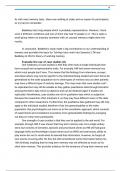4
As with most memory tests, there was nothing at stake and no reason for participants
to try hard to remember.
Baddeley had a big sample which is probably representative. However, there
were 4 different conditions and one of them only had 15 people in it. This is quite a
small group where an anomaly (someone with an unusual memory) might skew the
results.
In conclusion, Baddeley's study made a big contribution to our understanding of
memory and provided the basis for Tulving's later work into Semantic LTM and
Baddeley & Hitch's theory of working memory.
Evaluate the use of case studies (8)
One weakness of case studies is that they often look at single individuals that
have unusual and unrepresentative traits. For example, HM had severe memory loss
which most people don’t have. This means that the findings from interviews, surveys
and observations may only be specific to the individual being studied and can’t hence be
generalised to the wider population nor to other types of memory loss as other patients
may have a different type of memory damage. This may mean that case studies can’t
be replicated but may still be reliable as they gather quantitative data through biometric
and psychometric data which is objective and can be obtained again if studies are
replicated. Nonetheless, case studies are rich in qualitative data which is subjective
because the researcher often interprets it, so they may have different views of the data
compared to other researchers. Furthermore, the qualitative data gathered may still only
apply to the individual studied, therefore it has low generalizability to the wider
population. But psychologists can move on to the nomothetic approach, which consists
of experiments and correlations to produce more generalizable findings by averaging
out data on many more participants.
One strength of case studies is that they can be applied to the real world. For
example, through HM, it was shown that long term memory was not a single unitary
store, but consists of semantic, episodic and procedural stores as HM still had good
language skills and knowledge of past events such as WW2 and astronauts, ability to
play tennis but not to recall when he learned that information. However, he forgot all
new events occurring after his 30s, but still remembered some information before his
16th birthday, implying that his long term memory was not affected as much as his
short term memory. This provides evidence for the existence of long term memory and




